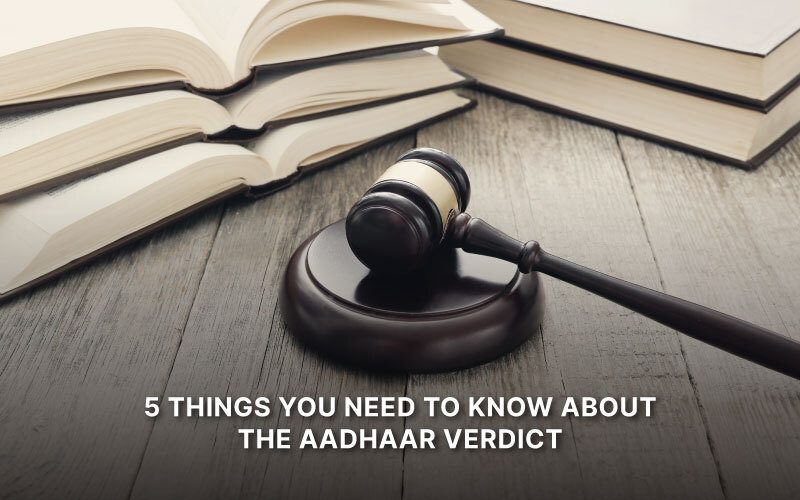Remember the times you were constantly reminded to update your Aadhaar card details by banks and telephone service providers? You will no longer have to, thanks to the Aadhaar Verdict by the Supreme Court on September 27, 2018.
Earlier, banks denied accounts to people without an Aadhaar card. Insurance companies denied payouts. Telecom operators insistently asked their customers to link their phone numbers to avail their benefits.
Now, you will no longer need to link your biometric-based Unique Identity (UID) number with private companies. A major reason for this was the multiple loopholes, lack of clarity in the restrictions, and the overall ambiguity in the process. This landmark judgment has clouded the minds of people with tons of questions, here’s answering some of them.
1. What’s the crux of the Aadhaar Verdict?
The Aadhaar verdict highlighted 3 main aspects:
- Recognized Aadhaar as a digital identity infrastructure
- Dismissed the idea of implementing Aadhaar as a surveillance tool
- Declared it unconstitutional for private companies to make linking Aadhaar details a mandate
A 1400 page (PDF) ruling, deemed it unconstitutional for private players to ask, collect and use personal details from customers. This means that banks, telecom companies, e-wallet operators, and other private companies can no longer make it mandatory for their customers to provide their UID numbers.
Here’s what some of India’s thought-leaders have to say on Twitter:
The issues addressed in the #AadhaarVerdict are fundamental to the Indian polity—privacy, protection against overreach by the state and private parties and most importantly, identity and one’s right to access basic services. My views in @livemint: https://t.co/MLgCCdnB0g
— Nandan Nilekani (@NandanNilekani) September 27, 2018
Although the #AadhaarVerdict is a good one, privacy issues still a huge concern & also what about the data that the banks, telcos etc already have? How would the abuse of the available data be stopped?
— Priyank Kharge / ಪ್ರಿಯಾಂಕ್ ಖರ್ಗೆ (@PriyankKharge) September 27, 2018
2. Why did some private companies make the linking a mandate?
The conventional ways of verifying a customer’s identity are through government-issued documents such as passports, voter ID, etc. The conventional ways of customer verification often require manpower, huge budget allotments, and time. Most private companies instead chose to use the eKYC for faster and cheaper customer verifications.
As per qz.com, Reliance Jio acquired close to a million customers per day, with their 15-minute eKYC process. Re-verifying these users, will pose a task. Thus, it’s safe to say, the verdict may cause quite a steer among these companies.
3. Why is it deemed unconstitutional?
The Supreme Court has declared it unconstitutional for private companies to collect the UID details of customers. This is being done to protect the constitutional rights (Right to Privacy) of the citizens.
4. What happens to the data they have already collected?
As per reports, 712 million of the 1 billion registered mobile users linked their UID numbers to their mobile numbers, last year. 870 million bank accounts are already linked with their Aadhaar details. The majority judgment does not cover deletion or de-linking of data. There are still no clear instructions on what these private institutions should do with the data.
5. Where will Aadhaar still be required?
#AadhaarVerdict explained pic.twitter.com/qCT8tna2hG
— ET Wealth (@ET_Wealth) September 27, 2018
Accordingly, Banks, telecom companies, and other financial institutions can no longer make it compulsory for their customers to provide their UID details to avail of benefits. Though, citizens will still need to provide their UID details for filing returns and PAN cards.
Understanding KYC
While you don’t need to link your Aadhaar to your bank account or phone number anymore, documents like PAN cards and bank statements are a crucial part of the KYC process. It is best to know the KYC guidelines that have been set by The Reserve Bank of India. This is to help private companies whet the risk ability of a customer. By all means, it is compulsory to submit a list of documents to a technical service provider like a bank or a payment gateway. Here is a list of legit documents your business must-have.
Avoid paperwork!
At Instamojo, we like to keep the paperwork to a bare minimum. You don’t need to submit any papers if you want to collect payments under Rs.10,000 a month. Simply submit your pan card, bank statement, and business certificate, and remove limits.
Start with Instamojo in minutes!


1 comment
this info is really helpful for me i don’t know before the day after reading this article i get some more info keep doing its really helpful as always,